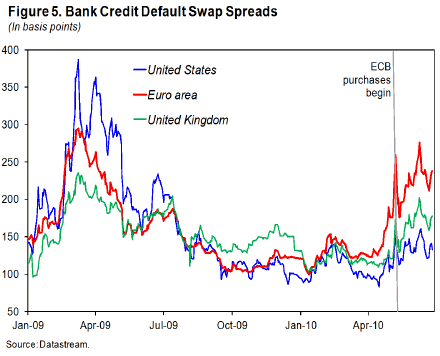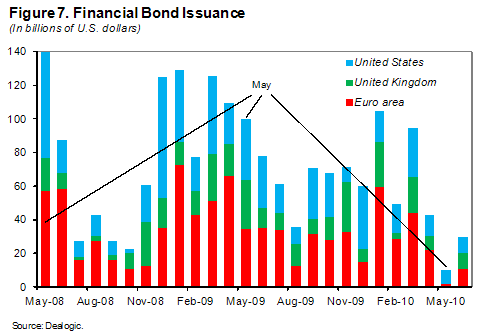The International Monetary Fund has released an update to the Global Financial Stability Report:
Despite generally improved economic conditions and a long period of healing after the failure of Lehman Brothers, progress toward global financial stability has recently experienced a setback. Sovereign risks in parts of the euro area have materialized and spread to the financial sector there, threatening to spill over to other regions and re-establish an adverse feedback loop with the economy. Further decisive follow-up is needed to the significant national and supranational policy responses that have been taken in order to strengthen confidence in the financial system and ensure continuation of the economic recovery.

Banks are also confronted by significant funding pressures coming from maturing bonds. As was emphasized in the April 2010 GFSR, banks face a wall of maturities in the next few years, especially in the euro area, and the recent turbulence has at least temporarily dampened the primary market for financial institutions’ bond issuance

Regulatory reform efforts aimed at making the global financial system safer need to continue in an expeditious fashion. The basics of such reforms—to the quality and quantity of capital and more liquidity—need to be finalized and an appropriate timetable for implementation established. The current level of uncertainty surrounding the final set of reforms is making it difficult for banks to take business decisions about various activities and constraining their willingness to lend. Greater clarity on the details and timing of intended regulatory reforms is thus required. Moreover, the implementation schedule will need to take into account the current health of the financial institutions and the status of the economic recovery to support trend growth and enhance stability. A crucial complement to regulatory reform is strong supervision. This applies in the steady state, but even more so during the transition period when there may be variances in the implementation of the new rules between jurisdictions. Adherence to strong supervisory principles can help contain the risk of regulatory arbitrage.
Presumably, the regulators will require extra staff, and hence extra managers. Fortunately, the IMF has some very well trained and competent staff who are willing to discuss the potential for new jobs!
[…] stung by IMF criticism of the pace of reforms, BIS has released a statement of progress highlighting their consultation paper on countercyclical […]